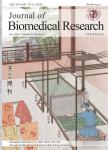Molecular cloning of human heat shock protein 27 and study of its protective effects on oxidative damage in rat cardiomyocte H9c2
Molecular cloning of human heat shock protein 27 and study of its protective effects on oxidative damage in rat cardiomyocte H9c2作者机构:Department of Gerontology the First Affiliated Hospital of Nanjing Medical University Nanjing 210029 China Center of Model Animal Nanjing University Nanjing 210045China.
出 版 物:《Journal of Nanjing Medical University》 (南京医科大学学报(英文版))
年 卷 期:2005年第19卷第4期
页 面:187-190页
学科分类:1002[医学-临床医学] 100201[医学-内科学(含:心血管病、血液病、呼吸系病、消化系病、内分泌与代谢病、肾病、风湿病、传染病)] 10[医学]
基 金:ChuangxinFundingofNanjingMedicalUniversity(CX2003018)
主 题:Heat Shock Protein 27 Molecular Cloning Transfection Oxidafive Stress Apoptosis
摘 要:Objective: To clone human cardiac heat shock protein 27 (HSP27) gene and to determine the effects of HSP27 on the oxidative stress in rat cardiomyocyte cell line H9c2. Methods: Full length of HSP27 cDNA which got by RT-PCR was constructed into pCDNA3.1^+ . The recombinant was transfected into rat cardiomyocyte cell line H9c2 and the stable trahsfection cell line was selected by G418. Then we observe the effects of HSP27 over-expression on LDH release and apoptosis induced H2O2 in H9c2. Results: ①pCDNA3.1^+/HSP27 provided a sound expression of HSP27 in both 293T and H9c2. ②LDH releasing induced by 0, 100,250,500, 1000 μmol/L H2O2 in HSP27 over-expression group and wild type group were 0.396±0.017 vs. 0.390±0.01)9 (p 〉0.05), 0.437±0. 014 vs. 0.416±0.015 (P〈0.05), 0.471±0.018 vs. 0.417±0.009 (P 〈0.001), 0.505±0.030 vs. 0.657± 0.022(P 〈0.001), 0.547 ±0.027 and 0.661 ± 0.011( P 〈 0. 001 ), respectively. ③Apoptosis induced by 150 μmol/L H2O2 in HSP27 over-expression group and wild type group were (10.693± 1.122)% vs. (4.027 ± 1.628)%( P 〈0.01). Conclusion: We cloned and constructed human cardiac HSP27 gene successfully, and over-expression of human HSP27 could inhibit oxidative damage significantly in H9c2.



